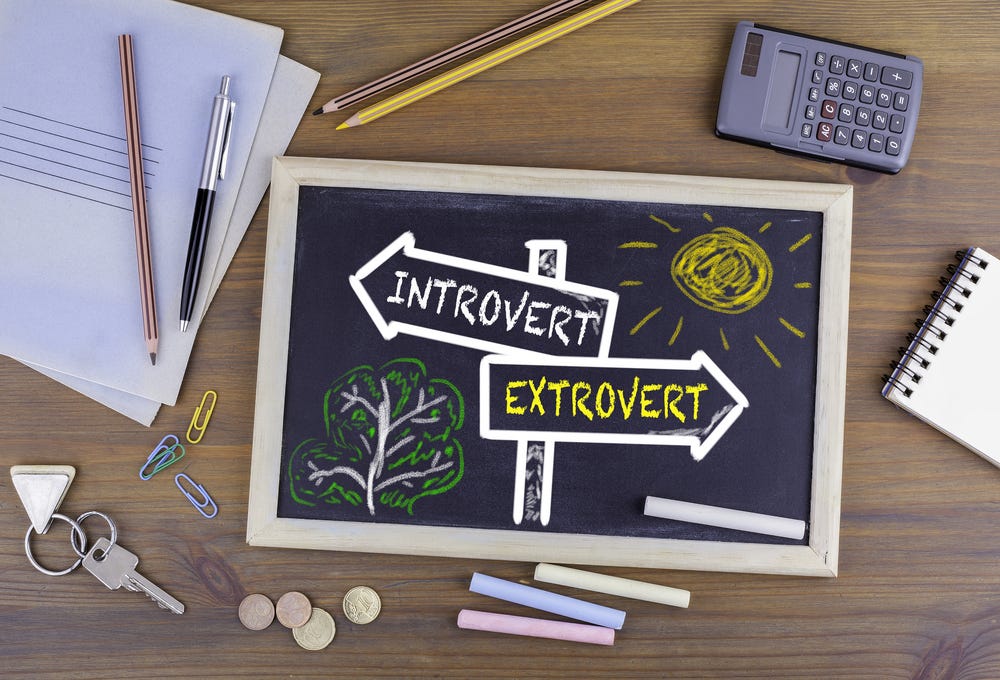London Life Coach Hans Schumann explains what drives your introverted behaviour and how to grow beyond its limitations.
Psychometric tests like Myers Briggs, DISC or Insight Discovery classify us as introverts or extroverts. But what do you do with this information?
Whilst extroverts are typically very comfortable with their social personality, many introverts struggle in a world that seems to be driven by extroverts. This raises the question whether an introvert can ever become more extroverted; and if they can, should they try to?
Is this the era of the introvert?
One of the few positives that I have been experiencing during the COVID 19 pandemic is that it has made me cherish the strength that I derive from my introverted nature. After decades of living in an extroverted world, finally being an introvert provides me with a competitive advantage. My extroverted friends and clients struggle being locked down in their homes. They feel imprisoned and starved of human connection. Many report how their emotional wellbeing is suffering.
Not me!
For introverts like me, the lockdown is easy because we are used to being alone and self-sufficient. In fact, the lockdown allows us to fully thrive in our sweet spot. I’ve been enjoying the simplicity and peace the lockdown has brought to my life and found myself much more productive. Indeed, it feels like we are in a brief era of the introvert.
I have always embraced my introverted nature and see coaching as one of its most beautiful expressions. At the same time there is no doubt that an introverted pattern can hold you back in life, in the same way as being too much of an extrovert also has its drawbacks.
The struggle of introverts
Being an introvert means that you find it energetically draining to socialise. You may well be outgoing, but can have a limited shelf-life in social situations. After being around people for a while, you feel an urge to withdraw to recharge. This can make it difficult for an introvert to thrive in such areas as self-promotion, dating, networking, marketing and selling. You may find that other people around you, who are more vocal and social, are also more successful even if they’re not as skilled, friendly or authentic as you.
Some introverts also feel that they are missing out in life, even though they are partly to blame for that by withdrawing into their own little bubble. There is a part of us introverts that wants to go out, have adventures, live life to the full, but then there is this also a strong pull into isolation. It can be difficult to counteract this pattern even if we can see how it deprives us of some of the happiness that we desire.
Can you fix an introvert?
No, because there is nothing to fix about being an introvert. Being an introvert is in no way worse or better than being an extrovert. Both have advantages and drawbacks. Many introverts, including me, enjoy being introverts and live happy and successful lives.
At the same time it’s not about being one or the other. Introvertism and extrovertism are opposites on a spectrum of behaviour and we all are somewhere on this spectrum, maybe even in perfect balance in the middle.
While you may be happy being more of an introvert, I believe that it is useful to be able to lean more towards the extroverted end of the spectrum from time to time. It provides us access to additional tools and resources in life. This applies to any behavioural patterns that we may have, not just to introvertism. If we become too comfortable in our usual patterns of being, we are not fully leveraging the whole range of options that we have to engage with life; and the more options we have, the better we become equipped to create the life we want.
So I am not advocating that you change who you are, but seeking to give you the freedom to move around a bit on the spectrum of introvertism to extrovertism.
Understanding the driver of your introvertism

If you are an introvert and would like to stretch yourself a little bit, how can you act and feel more like an extrovert from time to time?
To answer this question, we need to understand what drives your introverted pattern. This is what most conventional psychometrics tests like Meyers Briggs and Insight Discovery fail to tell us. They treat all introverts as the same and do not explain why some of us are so attached to our introverted behaviours.
I use a different psychometric test that offers this missing piece of information. It is called the Enneagram. It not only tells us what personality traits we have, but also why we have adopted them. The Enneagram divides personalities into 9 types and 27 subtypes. The difference between those types is the core motivation that drives how you think, feel and act. This motivation derives from your childhood. When we were children, we depended on adults for our survival and our innate survival instinct made us pick a strategy to win their attention. We created a way of being that, back then, we thought would help us be safe and loved. Examples of such survival strategies are:
- Be perfect
- Be helpful
- Be the best
- Be special
- Be quiet
- Be careful
- Have fun
- Be strong
- Adapt to avoid conflict
Each of these strategies created certain values, worldviews, fears and beliefs in us. They formed our personality and we still play them out as adults. We use a bit of each of them from time to time, but there will always be one or a few that dominate our personality. The Enneagram psychometric test tells us which ones they are.

So how does this relate to introvertism?
Each of the Enneagram types can either be introverted or extroverted, but if you are an introvert, your Enneagram type will help you understand why.
Let’s look at some of the Enneagram types that can drive an introverted pattern:
The Strict Perfectionist

The pattern: If you are a Strict Perfectionist, you will spend a lot of energy on constantly self-regulating yourself in front of others. At the core of this type is a subconscious effort to avoid criticism. Strict Perfectionists do this by trying to be perfect, to follow rules and to always do what they think is “right”. When they are with other people, they may constantly think about how they are perceived by them and regulate their behaviours to be safe in social contexts. This can be exhausting; so exhausting, in fact, that it can drive a desire to avoid too much social interaction.
The growth path for introverts: If this pattern resonates with you, then you might benefit from letting go of your high standards and learning to be comfortable with criticism. The more you can ease into just being you with others, the easier you will find it to enjoy socialising.
The Intensive Creative

The pattern: The Intensive Creative is driven by a desire to be special and authentic. To a certain extent we all want this but, like all Enneagram types, the Intensive Creative tends to focus too much on this desire. One of the side effects of wanting to be special is that it can create a separation between us and others. As an Intensive Creative you may think that you don’t belong to the social groups that other people form. You may cherish being different, but at the same time suffer from the separation you experience, feel lonely and misunderstood. If the Intensive Creative is also an introvert, she may then lean towards withdrawing from social interactions and indulging in a downwards spiral of negative thoughts.
The growth path for introverts: If that’s you, then it’s important to realise that the separation you experience is just in your head. You created it. What separates you from others is simply the story that you are telling yourself about yourself and others. Deconstructing this story can be deeply transformational. If you then also move away from focusing too much on your own emotions and problems and shift to those of other people, you may experience more emotional balance in your life and improve your relationships with others. You may well learn to enjoy joining others more often, and to blend in with groups and find nourishment from deepening those connections. This will not make you any less special.
The Quiet Specialist

The pattern: Whilst all Enneagram types can either be introverted or extroverted, I have yet to find an extroverted Quiet Specialist. If you resonate with this type, you probably value alone time for reflecting, researching and recharging. You like peace and quietude and enjoy them in your own introverted bubble.
Often this type holds a belief that his or her energy resources are limited. They feel that there is only so much they can give to others and that connecting with others depletes their energy resources. Yet people cannot really suck energy out of us. It’s not them that drain us; it is the way we process social encounters in our mind that may give us the experience of being drained.
The growth path for introverts: Quiet Specialists might benefit from appreciating more the nourishing support that others can give you if you let them into your life. Indeed, often Quiet Specialists do enjoy social interactions when they allow them to happen. What can help in this respect is to practise engaging with emotions more deeply, both your own and those of other people, because emotions are what connects us to others.
The more often Quiet Specialists leave their introverted bubble, and the more they engage with the emotions of others, the more likely it also becomes that they meet people they enjoy being with. Those people may even have answers and new ideas for the problems that they are used to solving on their own.
The Loyal Sceptic

The pattern: Loyal Sceptics tend to see the world as an unsafe place. Their awareness is focused on spotting threats and avoiding them. This can, but does not need to, lead to an introverted pattern. What safer place than being at home with your loved ones?
If this is you, you may find it difficult to trust other people. This may cause you to hold back from connecting with others in your personal and professional relationships. If you are an introverted Loyal Sceptic, you are probably close and loyal to just a small circle of friends who managed to win your trust.
Whilst this pattern may indeed help you avoid certain risks, it can also deprive you from much joy in life. At the end of the day, although Loyal Sceptics spend all their energy on being safe, they never actually feel safe. Like all Enneagram types, they play a game they can never win.
The growth path for introverts: Loyal Sceptics can grow beyond the limitations of this pattern by making friends with their fears, relinquishing some degree of control and enjoy trusting more people.
The Adaptive Peacemaker

The pattern: Adaptive Peacemakers seek peace and harmony. They do this by becoming masters in adapting and avoiding conflicts. They are easy to like because they tend to go with the flow of the crowd and hardly ever disagree with you. However, this can lead to them feeling controlled by others, although it was them who relinquished the control. Rather than asserting their own desires with others, Adaptive Peacemakers often withdraw into the comfort of their own domestic bubble, where they feel free from other people’s agendas and pressures. They may also escape into routines or creature comforts that serve as a substitute for the things they really want but failed to stand up for in life.
The growth path for introverts: Introverted Adaptive Peacemakers will benefit from exploring what they really want from life and how to pursue their own agenda confidently. This will involve saying “no” more often, establishing boundaries and clearly expressing preferences. The more Adaptive Peacemakers can assert themselves in social settings, the more likely they are to enjoy them.
What type of introvert are you?
Do any of the above types resonate with you? Maybe you can even see how a few of them play out in your life? I certainly can. Catching myself when I express one of the above patterns helps me be kinder to myself and at the same time consciously chose a different course of action rather than letting my life run on autopilot.
Once you understand the drivers of your introverted behaviour, you can make adjustments to grow beyond its limitations. This could involve changing your beliefs about yourself and others, learning from the patterns of other Enneagram types and cultivating small and regular steps that stretch you beyond the confines of your type.
Rather than changing who you are, you will add new ways of being to your existing personality.
________________
This article was first published at www.hansschumann.com


